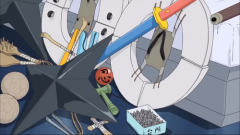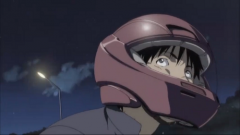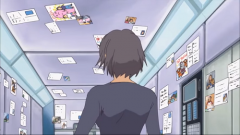Welcome one and all to another week of Planetes, continuing Throwback Thursday! This week we have a beautiful contrast of Life and Death in space followed by a lighthearted affirming of the group dynamic. Lets jump in!
Before I get into actual plot elements, I want to once again praise Planetes for its use of technology. Every week it finds a new avenue of science to explore, trying its best to be correct. Weaving in political elements and commentary throughout. Take for instance the damage caused by Radiation Poisoning in Episode 7. Or the difficulties of capturing a liquid debris in space. That these are questions at all in a Science Fiction anime is amazing. I recently learned that JAXA, the Japanese Space Agency, actually served as a technical consultant on the series. And that on the US DVD’s, interviews with two NASA Scientists were included. Combine all of this with the care Planetes takes to connect these elements to an actual, deep personable story? It makes me want to find and buy these DVD’s just to get more Planetes content.
Now, let’s focus on Episode 7, Extraterrestrial Girl. This one? This had me tearing up a bit at the end. Every bit of this episode was packed with meaning and contrast. From Roland, dying in space as his final wish, to Nono being born in and living in it. Both of their stories questioning perspectives and how people view the world. The difference in perspectives that the location you are born in provides. It blends very well with Planetes very clear message of how silly our divisions are. Even beyond the obvious of Roland and Nono, Planetes contrasted Nono and Hachimaki. His ocean in Japan vs her Ocean on the Moon, the Sea of Tranquility. To be perfectly honest, the message, visuals and sound all combined to be one of the most beautiful scenes I have seen this year. I want more of this.
Onto specifics, and first off the girl. I thought it rather obvious that Nono was a child when she mentioned how long she was on the moon. The title and her personality made it very clear what was going on. Was it obvious? Yes, but it was done well. It also wasn’t her only purpose. Because Planetes wasn’t content to just use her character to drive home a story of perspectives and living on the moon. Planetes also decided to use her to push Tanabe’s character forward, starting the possibility of romance with her and Hachimaki. With no character knowing her age, it makes Tanabe think about it and jealous of it, without presenting a legitimate romantic rival. A nice sort of forced confrontation with her emotions. A little something extra, that can be referenced and sprinkled in future episodes. Just like Planetes did with Episode 8!
Before I get to Episode 8 though, I wanna touch on the other central character of Episode 7. Roland, the Astronaut. His old age and history provides an interesting contrast with Nono’s youth. His seeming depression, trapped in a hospital unable to actually go out to the space he loved. He never wants to visit Earth again, even though he can. While Nono wants to see it, but might never be able to. How he was killed by Space and its radiation, causing Leukemia, while Nono grew up and was given life in Space. Even his death, alone and quietly in space, was beautiful. If only for what it changed in our leads, Fee and Hachimaki. I realize that I have been going on and on about this, and I will get to episode 8 in a moment. I just really loved this episode. Let’s move on.
Now we can finally hit Episode 8, A Place to Cling To. In case you hadn’t guessed it’s clearly outdone by the previous episode. That isn’t to say it’s not good though. Episode 8 is a much lighter, funner episode that still informs us as to our characters. Recently we have been getting more time with Fee of all people, and this episode capitalizes on that. Now what I mean about lighter is that Episode 8 of Planetes doesn’t have any great philosophical concepts or commentary. It more sets itself up for future episodes like that with the Division Chief and Fee characters. Their past and the Chief, Dolph’s, goal and reason for being in the company. It does this while injecting the comedic antics of Ravi and the rest of the gang to, though again Tanabe set me off a bit. At least this week she was right.
What Planetes did manage to do with Episode 8 was make me interested in Dolph and his role in the whole story. It seems to me that he will be central to the greater plot the 2nd half will inevitably have. Planetes spends a lot of time setting up Dolph’s past and goal. How his company was bought by Technora, and he accepted to try and change them from the inside. The question is, change them for what? I doubt Dolph will be a bad guy, as Fee likes him and she seems a good judge of character. I do suspect that he will be the first “casualty” either career or life wise, for whatever is to come though. Based on the 1st Episode, and how it told us of the wars going on back on Earth, I suspect it will tie in with that and Technora’s global reach.
All in all, another fantastic week of Planetes. I really want to be impartial, to find something Planetes does wrong. But I am simply loving every bit of it. I have to hold myself back from binging through the entire series, so that I can write these posts each week. So instead of hearing me gush about it for another hundred words, tell me what you think. Are you enjoying this look back at an older anime? Where does it stand for you among the anime of the current season? I ask because for me, I look forward to Planetes each week more than I do anything else.
Let me know below, and I will see you next week!








I’ve been rewatching this series with my brother recently, and these two episodes were top notch. Science fiction, philosophy, humor, romance, interpersonal drama… Planetes has it all. I got the same theme of “differing perspectives” from episode 7. Nono is a child and Roland is an old man, and the series puts the adult Hachi squarely between them in terms of his outlook and chief desires. I love the way Planetes presents itself – with just a few exceptions (usually whenever Tanabe goes Full Idealist), we’re encouraged to sit back and digest its various themes and plots without being forced into a participatory role. That’s why the show feels so plausible, at least to me.
Tanabe going full idealist is, in the first half, easily the least enjoyable part.
At least its played to good use in the second half I feel, though I am not completely sure its worth it.